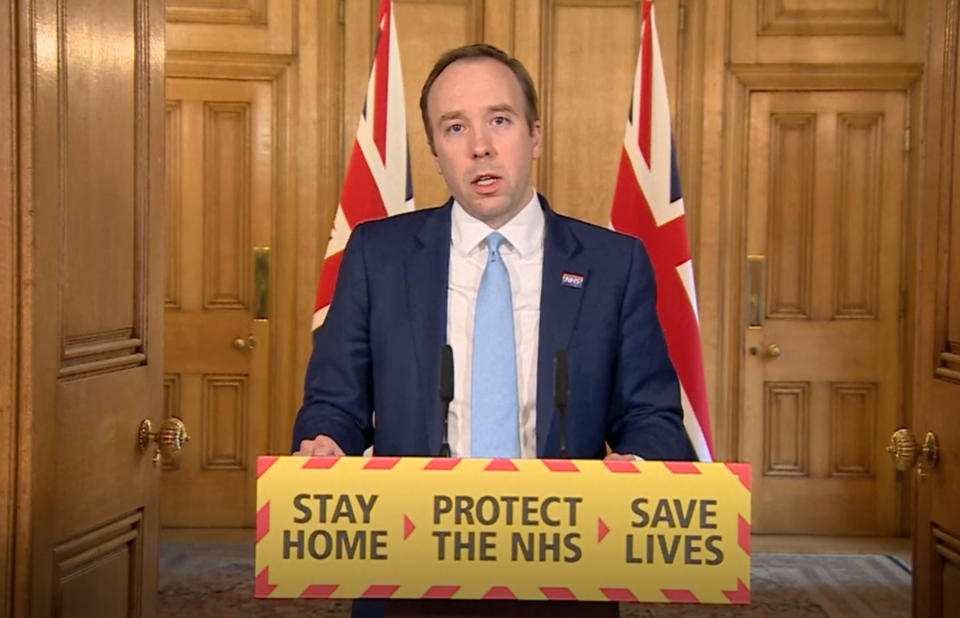Three questions the government didn't answer in today's coronavirus press conference

In recent days, the government has come under increasing fire for not answering difficult questions about the coronavirus crisis.
As the number of UK deaths continues to accelerate, health secretary Matt Hancock – out of self-isolation after contracting COVID-19 himself – led the government’s press briefing in Downing Street on Thursday evening.
Here are three questions he did not answer.
Hancock was asked for a firm date on when any NHS staff who need a test will get a test
The health secretary wouldn’t give a date and only said it would be by the end of the month.
Here is his response: “I am glad we are able to speed it up. It will absolutely be before the end of the month.
“With 5,000 tested since it started at the weekend, we’ve clearly made significant progress and I’m really glad the figures of those in the NHS who are absent due to coronavirus are lower than have been previously reported.
“We will get there as soon as we can. I am absolutely determined to make commitments we can meet rather than over-promise.”
It came after Hancock set a “goal” of reaching 100,000 coronavirus tests a day, including the public, by the end of April.
The government has been under pressure this week over the testing of NHS staff. NHS England alone employs 1.2 million people.
Hancock was asked how long the UK’s lockdown will last
A reporter quoted Hancock as saying antibody testing would be key to lifting the lockdown. However, with this said to only be effective after 28 days, he was asked if the draconian lockdown measures would therefore be in place “for some time to come”.
He refused to be drawn into a timeframe.
Here is his response: “Testing is critical to lifting the lockdown and hence the need to expand all parts of testing and making sure we understand how much of the population has got the antibodies – because some people may have the disease and develop antibodies without having symptoms. That is a critical part of understanding the antibody testing as well.
Latest coronavirus news, updates and advice
Live: Follow all the latest updates from the UK and around the world
Fact-checker: The number of COVID-19 cases in your local area
6 charts and maps that explain how COVID-19 is spreading
“I wouldn’t read, from what I said, a link of 28 days through to the time the lockdown will be in place, because the number one thing that stops the spread of this virus is social distancing. That is the most important thing.
“There has been a lot in the news about testing and I understand people craving, wanting to know, their coronavirus status. I get that. But the number one message is to stay at home. The more people that stay at home, the fewer transmissions there will be, the quicker we will be through it.”
Hancock later said the government can only be “guided by science” and that the lockdown will only be lifted once the rate of infection goes down.
Hancock was asked what proportion of the 100,000 tests a day will be antigen
Antigen tests detect whether the coronavirus is present in the body, while antibody tests show if someone has had it in the past. Antigen tests are considered to be needed more urgently than antibody tests.
Hancock did not give an exact figure.
Here is his response: “If one of the blood tests that can be done at home and available in large numbers across the world, if one of them works well enough, then of course we will have very significant numbers.
“But that is a scientific judgment, not a judgement I can make, and therefore I’m not assuming any of those in my figures to get to 100,000 tests a day.”
Hancock did, however, speak candidly on other issues
Asked how he got his coronavirus test, Hancock admitted those in “decision-making positions” are given priority.
And, asked if it was right that Premier League footballers remain on full pay, Hancock called for them to take a pay cut. "Given the sacrifices that many people are making – including some of my colleagues in the NHS who have made the ultimate sacrifice of going into work and have caught the disease and have sadly died – I think the first thing that Premier League footballers can do is make a contribution, take a pay cut and play their part.”

